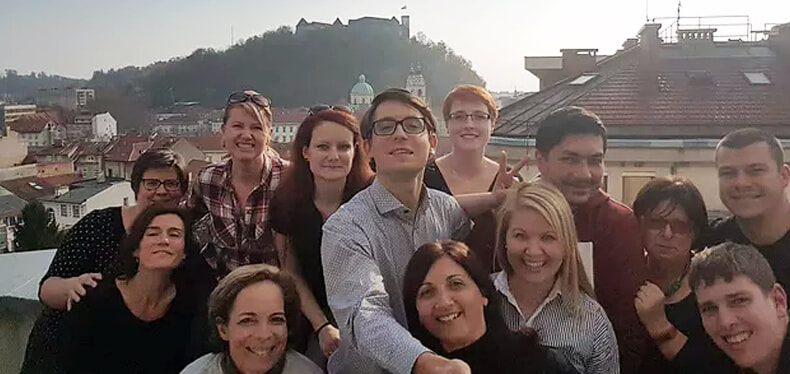|
Unknown friends
Hungarian’s experience of Erasmus+ training courses in Slovenia Although I planned to read something about the place where I was going, because of the chaotic events in weeks before the trip, I did not have the time to do so. To be honest, I knew virtually nothing about this little country, when I left for Ljubljana on a cold October morning. I sat on a train and started looking out of the window. I was looking at the swirling landscape and listening to the people who took on and off the seats. As time went by, landscapes changes and so do people. View started with the plains changing into the slopes and the hilly landscape of Zala, then the mountains appeared in the horizon. Finally, on the shore of the Sava, at the bottom of the steep slopes, we were leaning towards our goal. The audience changed along with the landscape, and I was in a kind of pleasant ignorance in the sounds of familiar and unfamiliar languages (Slovenian, Italian, German, Hungarian etc.). Due to the constantly changing scenarios, I had crossed the borders of countries and landscapes almost without noticing. Erasmus+ course on Conflict Management. It was raining, and it was very dark when I came to Ljubljana. There was hardly any traffic on the streets, the city was surrounded with silence and tranquillity, perhaps due to the hopeless weather. As I have been trying to find my way to hotel, I found out that I do not feel the usual “I am abroad” excitement at all. Instead, I had this powerful friendly feeling, which remained with me all the time during my stay in Slovenia. It felt like home. The country at the juncture of the Mediterranean, Central Europe and the Balkans, loves to combine the effects of the three directions and forms a mixture of things that are both familiar and unknown at the same time. Except for culinary specimens, the compulsory glass of water, the lasagne served with sour cream, and the “kremšnita” offered as a Slovenian specialty, you can feel the German influence, which is a minimum twin to our Franciscan, which give you some familiar feeling. Tasting famous “kremšnita” at Lake Bled. “Cultural crossroads, common history. This is how it is with nations.” we might say. But does not this also work with all of us? During the time spent together, do not we take over from each other, like thoughts, words, gestures and even intonation? Is it enrichment or adaptation? After all, isn’t it both? Six days, seven nights, fifteen people. For them/to us, this October courses in Ljubljana was about learning to understand each other better, to meet another person and to make acquaintance in unknown person. Author: Arbanász Ildikó Original text: http://aporpalyazat.wixsite.com/welcome/single-post/2017/10/28/Itt-a-v%C3%A9ge |
primeraWe empower teachers so they can do their job best. Categories
All
LINKSPrimera's practical handbook for writing high quality Erasmus+ mobility projects.
Pan-European Conference on Digital Education Facebook Community. Primera's FB page. Work with us on Erasmus+ KA2 projects: STEP Institute. |
Erasmus+ by Primera for teachersErasmus+ courses by Primera are dedicated to teachers who value evidence-based and practice-driven training in highly interactive international atmosphere.
OID Ljubljana: E10091479 OID Vienna: E10298896 E: [email protected] T: +386 1 320 28 43 Privacy Policy |
Navigation |
Stay tuned! |
© 2020 Skupina Primera Ltd. All rights reserved.



 RSS Feed
RSS Feed